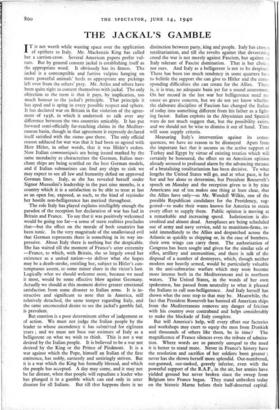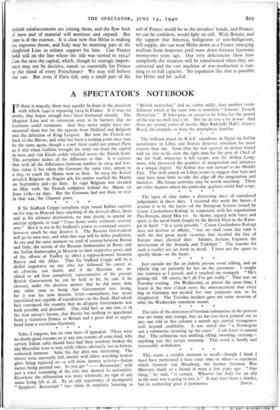THE JACKAL'S GAMBLE I T is not worth while wasting space
over the application of epithets to Italy. Mr. Mackenzie King has called her a carrion-crow. Several American papers prefer vul- ture. But by general consent jackal is establishing itself as the appropriate word. It obviously has its fitness. The jackal is a contemptible and furtive vulpine hanging on more powerful animals' heels to appropriate any pickings left over from the others' prey. Mr. Attlee and others have been quite right to content themselves with jackal. The only objection to the term is that it pays, by implication, too much honour to the jackal's principle. That principle it has aped and is aping in every possible respect and sphere. It has declared war on Britain in flat violation of the agree- ment of 1938, in which it undertook to talk over any difference between the two countries amicably. It has put forward semi-officially far-reaching claims in the Mediter- ranean basin, though in that agreement it expressly declared itself satisfied with the status quo there. The only official reason adduced for war was that it had been so agreed with Herr Hitler, in other words, that it was Hitler's orders. Now Italian communiqués are being issued marked by the same mendacity as characterises the German, Italian mer- chant ships are being scuttled on the best German models, and if Italian submarines can find any ships to sink we may expect to see all law and humanity defied on approved German lines. Italy; as she has revealed herself under Signor Mussolini's leadership in the past nine months, is a country which it is a satisfaction to be able to treat at last as an open foe, exposed, as such, to the kind of rejoinder her hostile non-belligerence has merited throughout.
The role Italy has played explains intelligibly enough the paradox of the reception her declaration of war has had in Britain and France. To say that it was positively welcomed would be going too far—a sense of stern realities precludes that—but the effect on the morale of both countries has been tonic. In the very magnitude of the unalleviated evil that German represents there is something in its way im- pressive. About Italy there is nothing but the despicable. She has waited till the moment of France's utter extremity —France, to which, with Britain, she so largely owed her existence as a united nation—to deliver what she hopes may be a death-stroke, entitling her, subject to Hitler's con- temptuous assent, to some minor share in the victor's loot. Logically what we should welcome most, because we need it most, would be some effective blow against Germany. Actually we should at this moment derive greater emotional satisfaction from some disaster to Italian arms. It is in- structive and significant to note that in America, still relatively detached, the same temper regarding Italy, and the same unconcealed desire to see the jackal's gamble fail, is prevalent.
But emotion is a poor determinant either of judgement or of action. We must not judge the Italian people by the leader to whose ascendency it has submitted for eighteen years ; and we must not base our estimate of Italy as a belligerent on what we wish to think. This is not a war desired by the Italian people. It is believed to be a war not desired by the King or the Prince of Piedmont. It is a war against which the Pope, himself an Italian of the first eminence, has nobly, earnestly and untiringly striven. But it is a war which the King has formally blessed, and which the people has accepted. A day may come, and it may not be far distant, when that people will repudiate a leader who has plunged it in a gamble which can end only in utter disaster for all Italians. But till that happens there is no distinction between party, king and people. Italy has chosen totalitarianism, and till she revolts against that devastating creed the war is not merely against Fascism, but against zn Italy tolerant of Fascist domination. That is her choice, not ours. And Italy as a belligerent is not to be despised. There has been too much tendency in some quarters here to belittle the support she can give to Hitler and the corre- sponding difficulties she can create for the Allies. There is, it is true, no adequate basis yet for a sound assessment. On her record in the last war her belligerence need not cause us grave concern, but we do not yet know whether the elaborate discipline of Fascism has changed the Italian of today into something different from his father as a fight- ing factor. Italian exploits in the Abyssinian and Spanish wars do not much suggest that, but the possibility exists, and we should not be wise to dismiss it out of hand. Time will soon supply criteria.
Measuring Italy's intervention against its conse- quences, we have no reason to be dismayed Apart from the important fact that it secures us the active support of Turkey and Egypt by virtue of existing treaties which will certainly be honoured, the effect on an American opinion already aroused to profound alarm by the advancing menace of a brutalising totalitarianism has been decisive. To what lengths the United States will go, and at what pace, is for her and her alone to determine, but President Roosevelt's speech on Monday and the reception given to it by nine Americans out of ten makes one thing at least clear, that the Allies have only—as Mr. Wendell Wilkie, one of ,the possible Republican candidates for the Presidency, sug- gested—to make their wants known for America to strain every effort to supply them. Public opinion is moving at a remarkable and increasing speed. Isolationism is dis- credited and almost dead. Aeroplanes are being scheduled out of army and navy service, sold to munitions-firms, re- sold immediately to the Allies and despatched across the Atlantic as quickly as shipping or, in the case of bombers, their own wings can carry them. The authorisation of Congress has been sought and given for the similar sale of rifles, artillery and ammunition, and there is talk of the disposal of a number of destroyers, which, though neither modern nor heavily armed, would be particularly valuable in the anti-submarine warfare which may soon become more intense both in the Mediterranean and in northern waters. The United States, in the words of her own spokesmen, has passed from neutrality to what it pleased the Italians to call non-belligerence. And Italy herself has shown what the next step to that may be. Meanwhile, the fact that President Roosevelt has banned all American ships from the Mediterranean removes any danger of friction with his country over contraband and helps considerably to make the blockade of Italy complete.
But will America's help, will every effort our factories and workshops may exert to equip the men from Dunkirk and thousands of others like them, be in time? The magnificence of France silences even the tribute of admira- tion. Where words are so patently unequal to the need it is better to stand- mute. Never in France's history have the resolution and sacrifice of her soldiers been greater ; never has she shown herself more splendid. Out-numbered, out-gunned, out-tanked, gravely inferior, even with the powerful support of the R.A.F., in the air, her armies have yielded ground but never broken since the sweep from Belgium into France began. They stand unbroken today on the historic Mame before their half-deserted capital. 3ritish reinforcements are joining them, and the flow both of men and of material will eontinue and expand. But tune is of the essence. It is clear now that Hitler is making his supreme throw, and Italy may be manning part of the Siegfried Line to release support for him. Can France hold still on the line where the tide was turned in 1914? Can she save the capital, which, though its strategic import- ance may not be decisive, stands so essentially for France in the mind of every Frenchman? We may still believe she can. But even if Paris fell, only a small part of the soil of France would be in the invaders' hands, and France, we can be confident, would fight on still. With Britain, and the support that America, belligerent or non-belligerent, will supply, she can wear Hider down as a France emerging resilient from desperate peril wore down Greater Germans twenty-two years ago. Our very deficiencies show how completely the situation will be transformed when they are corrected and the vast machine of war-production is run- ning to its full capacity. No expansion like that is possible for Hitler and his jackal.































 Previous page
Previous page